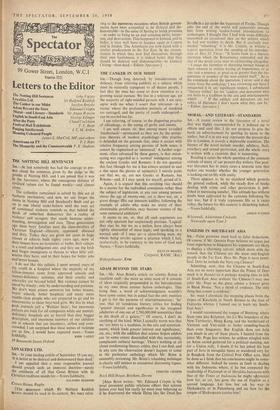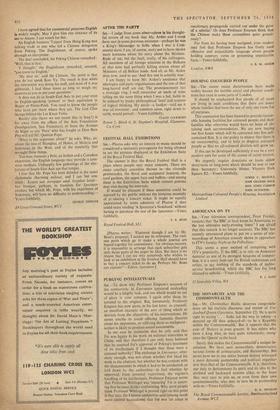ENGLISH IN SOUTH-EAST ASIA
SIR,—False premises must lead to false deductions. Of course, if Mr. Quentin Pope believes we argue just from experience in Singapore his arguments are likely to display a charming nalvetif, which starts with the remark that the Chinese are the most anti-English people in the Far East. Here Mr. Pope is most ponti- fical. Does he include the Nanyang Chinese?
Admitting, now, that the Chinese in South-East Asia are no more important than the Prince of Den- mark is in Hamlet (is it perhaps wasting time to talk of South-East Asia without the Chinese'?) may one refer Mr. Pope to the. great advice a lawyer gives in Bleak House. 'Not a shred of evidence. The only thing that counts is evidence.'
Sir, must I chronicle the stopping places from the slopes of Kinabalu in North Borneo to the foot of Fujiyama whence I fanned out to learn my South- East Asia?
I would recommend the tongue of Bentong, where Siam runs into Kelantan, the Ln Wu boundary of the New Territories, Hong Kong, and the borderland of Vietnam and Vict-minh as better sounding-boards than even Singapore. But English does not help you much in any of these places. I hazard from the letter Mr. Pope has written, he seldom mingled with an Asian crowd gathered for a political meeting, nor for a Union rally. I doubt if he has jolted the best part of Java in mosquito buses or wandered very far in Bangkok from the Central Post Office area. Had he done so 1 think that his conclusions might be some- what different. Indeed he seems at fault in dealing with his Indonesia where, if he but compared the readership of Podomah or of Merdeka Indonesia with that of the Times of Indonesia he might alipreciate how far, as yet, has gone the use of English as a second language. Let him but ask his way in Djokjakaita or in Palembang and see how far the tongue of Shakespeare carries him! I have agreed that for commercial purposes English is widely taught. May I give him one instance of its ruse to Asians; I can vouch for this.
An English business 'Taipan' from Hong Kong was talking trade to one who led a Chinese delegation from Peking. The Englishman, of course, spoke through an interpreter. The deal concluded, the Peking Chinese remarked : 'Well, that is that.'
'I thought,' the Englishman remarked, amazed, "you knew no English.' 'My dear sir,' said the Chinese, 'the point is that you do 'not speak Kuo Yu. The result is that while my interpreter was doing his stuff, and most of it was gibberish, I had three times as long to weigh my answers as you to put your questions.'
It does not do in South-East Asia to put your trust in English-speaking 'princes' or their equivalent in Bogor or Pnom-Pcnh. You need to know the people who have put them where they are. The Lim Chin Siongs behind the Lee Kuan Yews.
Reality alas (have we not learnt this in Iraq?) is far away from the offices of the Asia Foundation (headquarters, San Francisco), or from the Avenue de Segur as any 'Para' who has fought at Dien Bien Phu will tell Mr. Quentin Pope.
'What is the argument about?' he asks. Why, sir, about the loss of Shanghai, of Hanoi, of Malaya and Indonesia, to the West, and of the insularity that wrought these things. Too true, between a Pole, an Indian and a Canadian expatriate, the English language may provide a com- mon medium. Unhappily few gatherings of the elec- torates of South-East Asia use that tongue.
fear that Mr. Pope has been deluded in the usual
diplomatic charming milieux, and can but con- clude: Ketam nak mengajar anak berjalan betul- too brusque, perhaps, to translate for Spectator readers, but which Mr. Pope, with his experience of Indonesia, will have no difficulty in understanding.— Yours faithfully,
14 Great Ormond Street, WC1



































 Previous page
Previous page